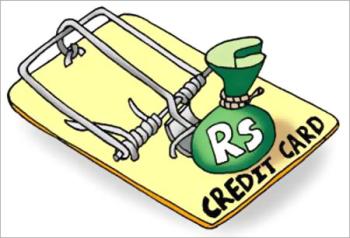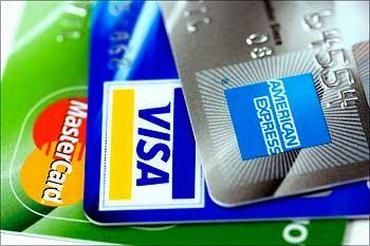Photographs: Rediff Archives Harsh Roongta, CEO, Apnapaisa.com
The festive season is upon us, spreading goodwill and cheer all over.
Meeting and gifting loved ones add more joy to the occasion.
But I was little surprised when my cousin approached me for advise on how to avoid overspending during the festival season.
He told me that blinking lights, tantalising schemes, discounts and cash back offers tempted him and his spouse into buying more for the family (and themselves) than what they had initially planned to spend.
It then takes them some time before they are able to pull themselves out of the burden of such unplanned expenditure (primarily made on credit cards) and resume their otherwise regular financial life.
If this sounds familiar to you then read on.
Here are some of the common sense based rules that I narrated to him which can be useful for all of you to make sure you do not repeat this cycle year after year.
 Apnapaisa is a price comparison engine that allows consumers in India [ Images ] the ability to compare the EMI, interest rates and other fees for home loans, car loans, personal loans, business loans, credit cards, compare online quotes and features of life insurance, health insurance, car insurance, travel insurance and other general insurance policies in India.
Apnapaisa is a price comparison engine that allows consumers in India [ Images ] the ability to compare the EMI, interest rates and other fees for home loans, car loans, personal loans, business loans, credit cards, compare online quotes and features of life insurance, health insurance, car insurance, travel insurance and other general insurance policies in India.
Common sense ideas to avoid overspending
Image: Samsung LCD TVPhotographs: Samsung.com
Firstly in most categories, the providers do reserve a budget for making good offers during the festival season and it is normally worthwhile to wait for a few weeks to take advantage of such offers that are invariably made during the festival season.
The rule is you should not buy a category that you were otherwise not planning to buy just because a good offer is available.
Say, for example, if you have not budgeted for a LCD television set, then you should not get tempted to buy it just because there is some mouth-watering discount being offered by an LCD maker or some bank is offering a zero per cent offer to increase their business.
This means that you should prepare a quick budget for the things you want to buy during the festival season.
Common sense ideas to avoid overspending
Image: Honda concept carAlso keep some room for impulse purchases by earmarking an amount for them. After all, what is the fun of shopping if you do not buy that fabulous purse that you saw while shopping for garments at a store?
Just make sure that you earmark an amount (say 10 per cent of your shopping budget) for such impulse purchases (which will invariably happen when you actually go shopping) and don't go over that amount.
If you are a regular shopper at a particular store and have loyalty points, it may also be a good idea to make a budget for your impulse purchases by encashing those loyalty points.
Common sense ideas to avoid overspending
If your shopping budget is not large, you can also carry cash for the purchases.
Research has shown that impulse purchases are lower and you tend to buy within your budget when you pay cash for your purchases.
However, if you are not comfortable carrying cash another alternative could be to use debit cards on a bank account where the amount of balance available is limited to your shopping budget.
Whilst payment by debit cards don't have the same level of sobering effect on your purchases as paying cash does, it is safer and you can also take advantage of the offers that most banks are giving to incentivise shopping purchases on their debit cards.
Ideally you should purchase only what you had budgeted for, anyway though the scheme or offer can make it cheaper to buy it or make you change your brand preference in that category.
Also be familiar with some of the common features of cash back rules on debit and credit cards to make sure you are taking the right decision.
Common sense ideas to avoid overspending
Normally there is a limit on the maximum cash back available. For example in a 20 per cent-cash back there could be an overall maximum limit of Rs 500 only.
Which means that on spends above Rs 2,500 you will not be eligible for any additional cash backs.
Cash backs are normally meant for spends during a fixed period of time and on certain categories (such as shops, restaurants, etc) and may not be available on many categories such as fuel, jewellery, etc.
Cash back will normally be available only if your credit card account is regular during the time the money was spent and also in the month in which the cash back has to be credited.
Big-ticket purchases such as car, house and jewellery by their very nature are normally budgeted for by most of us. So if there are good offers available on such purchases (including good offers on loans for buying homes or cars) one should definitely consider that as well.






Comment
article